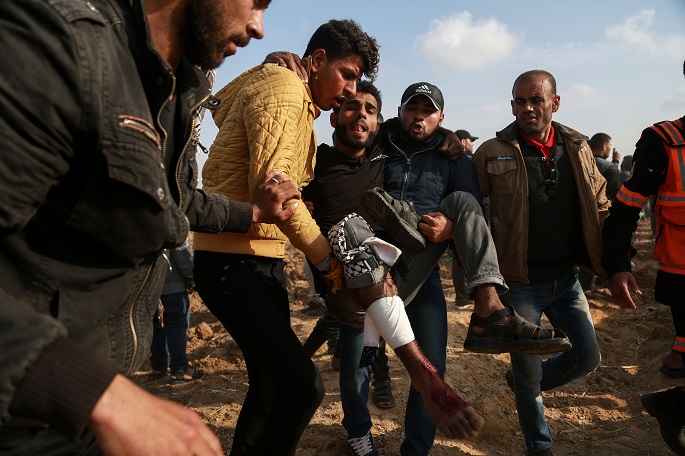3 Palestinians killed as Israeli soldiers fire gunshots on protesters
Published : 27 Apr 2018, 22:55
Daylong protests and clashes between hundreds of angry Palestinians and Israeli soldiers near the border between eastern Gaza Strip and Israel had left three Palestinians killed and 883 wounded, medics said.
Ashraf al-Qedra, spokesman of the health ministry in Gaza, told reporters that three were killed, adding that 427 were slightly injured and were treated in the field clinics, while 456 were treated at major hospitals in the Gaza Strip.
He said that 174 were injured by live gunshots, 19 by rubber-coated metal bullets, 58 by fragments of exploding gunshots and the rest were injured by tear gas.
The death toll since March 30 grew up to 45 and 6,500 were wounded, the spokesman said.
This is the fifth round of weekly protests for Palestinians to gather on the Gaza border with Israel. The rallies are part of what the Palestinians called the "Great March of Return" organized in the Gaza Strip against Israel.
The marches are organized in five different areas in eastern Gaza Strip close to the border with Israel, and are scheduled to end on May 15, the day after the 70th anniversary of Israel's declaration of independence but marked by the Palestinians as the Nakba Day, or "Day of the Catastrophe.
Meanwhile, the United Nations condemned the Israeli army's excessive use of force against the Palestinians. Al-Qedra said Israel used various kinds of ammunitions to disperse non-violent and peaceful protests.
The joint committee of the rally organizers also accused the Israeli army of using excessive force and various kinds of forbidden weapons against the demonstrators, which can be seen from the wounds of the demonstrators.
Eyewitnesses said clashes erupted after Friday prayers and the soldiers fired dozens of tear gas canisters and live gunshots to disperse the demonstrators who burned tires to make black smoke as shields, which would protect them from the fire of the Israeli snipers stationed at the borderline area.
The witnesses said that demonstrators threw stones at the Israeli army forces, while soldiers fired back tear gas and rubber-coated metal bullets. Paramedics are present in the area with ambulances and first medical aid.
Meanwhile, teenagers and youths flew kites carrying flaming pieces of clothes near the border, trying to set ablaze the Israeli agricultural fields.
Also, some young men set fire to dozens of tires, and others cut and pulled parts of the barbed wire of the fence.
Earlier Friday, thousands of Palestinians were preparing to join the fifth Friday of the rallies, which is called by organizers Friday of angry youths.
The health ministry in Gaza announced in a press statement earlier Friday that it sent its medical crews and teams of rescue to the areas in eastern Gaza Strip in case of emergency and more casualties during the protests.
Hamas activists called on the populations Friday morning throughout mosques loudspeakers to join the rallies and the symbolic funeral of Fadi al Batsh, a Hamas scientist who was killed in Malaysia by unknown militants last Saturday.
Meanwhile, the Israeli army announced Friday that it sent more forces to the border area to prevent any attempt of fence-cutting and infiltrating.
Eyewitnesses said that masked young men managed this morning to cut the fence of the border east of Jabalia town in northern Gaza Strip.
Hamas chief of the Gaza Strip Yehya al-Sinwar arrived Friday afternoon to the area east of al-Bureij refugee camp in central Gaza Strip to join the rallies.
"We are ... sticking to the right of return and we will seek to make it true by all means and capabilities. We are going ahead until making the goals of our people true and defy the siege," he told the demonstrators.
Hamas leader Ismail Haniyeh, who visited the area east of Rafah town in southern Gaza Strip, joined young demonstrators in pulling the barbed wire of the fence of the border between eastern Gaza Strip and Israel.
He said with outraged voice that "we applaud the unit of burning tires, the unit of cutting the barbed wire, the unit of flying kites," saying that the moves have terrified "the occupier."
"So if kites are terrifying the enemy, what would be the case of our missiles and bombs," he added.
"We will not hesitate and we will not retreat," Haniyeh said.


